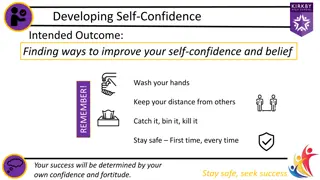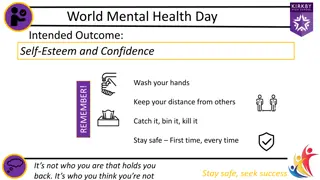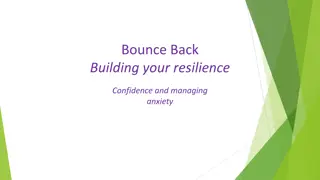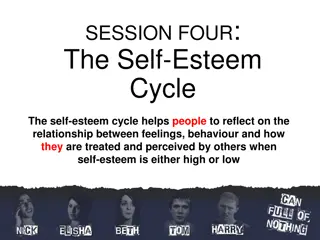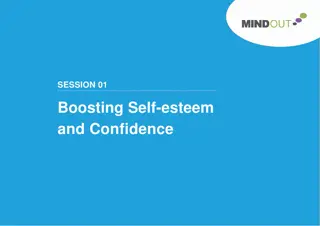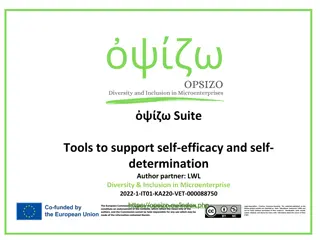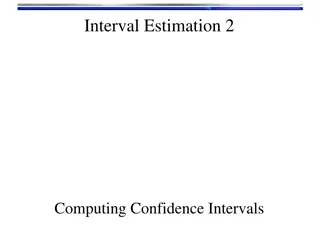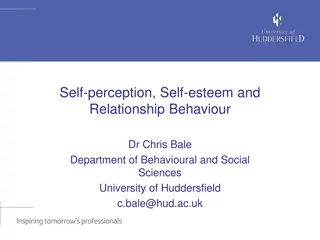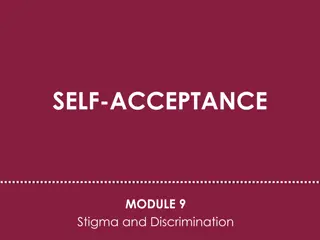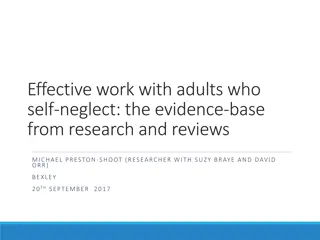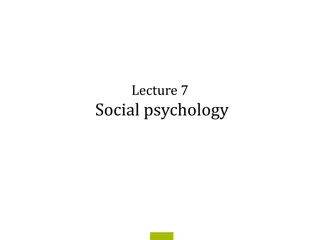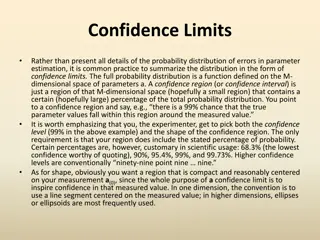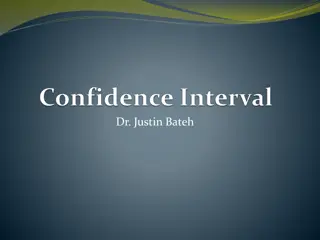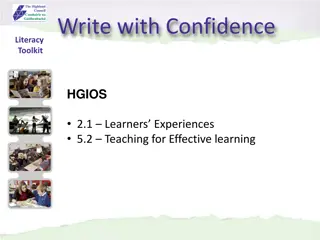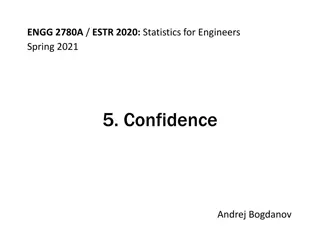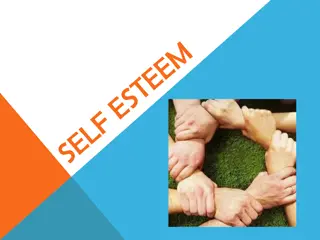Digital Citizenship: Self-Image, Social Media, and Self-Esteem
Explore the impact of social media on self-image and self-esteem. Learn about the influence of filters and media on body perception. Reflect on self-assessment and take-home activities to improve self-confidence.
3 views • 11 slides
Understanding Self-Worth in Children: Building a Strong Foundation
Explore the importance of self-concept, self-esteem, and self-worth in children's development. Learn how parents can positively impact a child's self-perception and self-value through nurturing experiences. Discover the key sources influencing children's self-worth and the critical role of early lif
0 views • 30 slides
Understanding Self-Esteem: Meaning, Importance, and Types
Self-esteem is how we perceive our worth and value. High self-esteem leads to confidence and positivity, while low self-esteem can result in self-doubt and negative emotions. Self-esteem impacts mental health, behavior, decisions, relationships, and overall success in life. Recognizing and nurturing
2 views • 15 slides
Understanding Self-Esteem and Ways to Improve It
Self-esteem is our perception of ourselves, impacting how we navigate life. Healthy self-esteem fosters positivity, while low self-esteem can be detrimental. Various factors, like childhood experiences, contribute to low self-esteem, but steps can be taken to improve it. Building positive relationsh
0 views • 14 slides
Understanding the Self: Psychology's Focus and Implications
The field of psychology has long been intrigued by the concept of self, exploring its importance to well-being, self-esteem, and brain localization. Research reveals how excessive optimism, self-bias, and blindness to incompetence can impact self-esteem. Contrasting individualist and collectivist cu
1 views • 41 slides
Understanding Confidence Intervals in Statistics
Confidence intervals provide a range of plausible values for a parameter, increasing our confidence in the estimate. In this context, you will learn to interpret confidence intervals, determine point estimates and margins of error, and make decisions based on confidence intervals. The concept is ess
1 views • 13 slides
Building Self-Confidence: Key Steps and Benefits
Understanding self-confidence, its importance, and how to develop it can lead to enhanced resilience, motivation, reduced fear and anxiety, and a stronger sense of self. Self-confidence allows for confident behavior, while lack of it can lead to self-doubt and avoidance of risks. Learning to embrace
0 views • 7 slides
Understanding Self-Esteem, Confidence, and Mental Health
Self-esteem and confidence are crucial for mental well-being. Self-esteem affects how we value ourselves, while confidence is about believing in our abilities. Negative and positive experiences impact these aspects differently. It's important to recognize and address factors that influence our self-
0 views • 9 slides
The Importance of Self-Awareness in Personal Growth
Self-awareness is crucial for understanding one's character, feelings, and motivations. It helps in recognizing strengths and weaknesses, managing stress, improving communication, and fostering empathy. Developing self-awareness involves introspection, mindfulness, self-reflection, and seeking feedb
2 views • 47 slides
Building Resilience and Confidence: A Guide to Overcoming Anxiety
Explore strategies to boost confidence, enhance resilience, and manage anxiety in academic and personal life. Learn valuable tips on time management, financial matters, and seeking additional support. Discover the art of confidence, academic resilience, effective study techniques, and self-care prac
2 views • 19 slides
Developing a Self-Care Action Plan for Overall Well-Being
Self-care involves deliberate activities to nurture mental, emotional, physical, and spiritual health, yet it is often neglected. This guide explores the essence of self-care, emphasizes the importance of building a personalized self-care action plan, and provides insights into taking care of your b
0 views • 19 slides
Enhancing Self-Confidence for Professional Success
Understanding the importance of self-confidence in the workplace is crucial for personal growth and career advancement. Self-confident individuals trust their abilities, maintain a sense of control over their lives, and have realistic expectations. This summary delves into the characteristics of sel
0 views • 13 slides
Understanding the Self-Esteem Cycle: High vs Low Self-Esteem
The self-esteem cycle explores the interplay between one's feelings, behavior, and how they are treated based on their self-esteem level. High self-esteem is associated with positive feelings, supportive behavior, and positive interactions, while low self-esteem manifests in negative emotions, withd
9 views • 4 slides
Boosting Self-esteem and Confidence Session for Students
This session aims to help students identify and increase their belief in personal strengths, boosting self-esteem and confidence. Students are encouraged to practice noticing their strengths and creating a list to remind themselves daily. The session focuses on building skills and self-esteem throug
0 views • 6 slides
Empowering Teachers through Mentorship: Erasmus+ Multiplier Event in Novi Sad
This event, co-funded by the Erasmus+ Programme, brought together 44 teachers from Serbia to explore the significance of mentoring in education. Participants engaged in surveys, discussions, and practical activities to enhance their self-confidence as mentors and support the self-confidence of mente
0 views • 13 slides
Building Self-Confidence in Healthcare Workplace
Discover the power of self-confidence in healthcare with tips to boost skills, communicate effectively, and embrace new challenges. Learn how confidence is a skill that can be developed through practice and awareness, leading to workplace pride and positive contributions. Explore the impact of nonve
1 views • 27 slides
Enhancing Self-Regulation for Formative Assessment through Social and Emotional Learning
Explore the significance of self-regulation in formative assessment, understand key concepts like self-control, emotional competence, and perseverance. Discover actionable strategies to implement self-regulation interventions with students and train other adults effectively. Future orientation and s
0 views • 25 slides
Understanding Mindful Self-Judgment and Its Role in Mental Health
Mindful self-judgment is a complex concept that involves balancing self-awareness and self-compassion. While nonjudgment is a key aspect of mindfulness practices, there is a debate on whether mindful self-judgment can be appropriate and functional in certain circumstances. Researchers like June Pric
2 views • 46 slides
Impact of Shadow Boxing and Pad Work Training on Self-Confidence of Muay Thai Participants
Muay Thai participants at Revolt Gym engage in shadow boxing and pad work training to enhance their skills and build self-confidence. Self-confidence in sports is crucial for success, and these training methods play a significant role in developing mental and physical capacities. The study investiga
3 views • 8 slides
Understanding Self-Esteem: Highs and Lows
Self-esteem is the judgment we hold about ourselves, shaped by experiences and relationships. High self-esteem individuals embrace new encounters with confidence and positivity, while low self-esteem individuals struggle with self-doubt and criticism. Recognizing signs of low self-esteem is crucial
0 views • 11 slides
Enhancing Self-Regulation Skills in Children: Strategies and Tips
Understanding and fostering self-regulation in children is crucial for their development. Self-regulation involves controlling impulses, focusing, and shifting between tasks. This article delves into the internal mechanisms of self-regulation, such as executive function, and provides practical tips
1 views • 22 slides
Understanding Estimation and Confidence Intervals in Statistics
Explore the concepts of point estimates and interval estimates in statistics. Learn how to construct confidence intervals for the mean and proportion, consider the finite population correction factor, choose an appropriate sample size, and calculate confidence levels using known population standard
0 views • 25 slides
Advanced Entrepreneurship Training with DEW Project EU
Explore advanced Entrepreneurship skills with DEW Project EU focusing on motivation, perseverance, creativity, and self-confidence. Gain insights on aligning motivation with achievable goals, boosting creativity to solve problems, and enhancing self-confidence. The training covers theoretical contri
0 views • 23 slides
Wisdom of Swami Vivekananda: Inspiring Youth to Fearlessness and Self-Confidence
Explore the profound teachings of Swami Vivekananda as he instills courage, patriotism, and self-confidence in the youth. Through inspiring messages of fearlessness and self-belief, Vivekananda's words resonate with the essence of Indian culture and heritage. Embrace the power within you to conquer
0 views • 12 slides
Boosting Your Child's Self-Esteem & Confidence in Parenting Workshop Series
Understanding self-esteem in children is crucial for their emotional development. Healthy self-esteem leads to positive behaviors, while low self-esteem can result in negative self-perceptions. Recognizing signs of healthy and unhealthy self-esteem allows parents to support and nurture their child's
0 views • 11 slides
Enhancing Self-Efficacy and Self-Determination in the Workplace
Establishing high levels of self-efficacy and self-determination in the workplace is crucial for accomplishing tasks and goals effectively. This publication explores the significance of these traits, providing strategies for managers to foster and maintain them. Discover why self-efficacy and self-d
0 views • 8 slides
Confidence Intervals and Interval Estimation in Statistics
Understanding how to compute confidence intervals is crucial in statistics to estimate parameters accurately. Confidence intervals are constructed based on sample size, mean estimate, estimated standard error, and chosen level of confidence. Using the Student-T distribution for sampling distribution
0 views • 14 slides
Understanding Self-Perception, Self-Esteem, and Relationship Behavior
The discussion explores the impact of low self-esteem on various psychological issues, societal views on self-worth, self-perception biases, and the consequences of self-esteem in different aspects of life, backed by research and theories such as the Better-Than-Average Effect and Sociometer Theory.
0 views • 19 slides
Trusting Your Internal Compass: A Path to Self-Discovery
Understanding self-trust is crucial for long-term happiness. Discover the importance of trusting yourself, signs of lack of self-trust, and how to rebuild trust through self-compassion and recognition. Embrace self-awareness, authenticity, and confidence to navigate life's challenges.
0 views • 21 slides
Understanding Self-Acceptance and Overcoming Stigma
Self-esteem and self-acceptance are distinct concepts, with self-acceptance focusing on embracing all facets of oneself unconditionally. Developing self-acceptance involves stages like aversion, curiosity, tolerance, and allowing. Overcoming avoidance and resistance can lead to self-compassion and g
0 views • 10 slides
Understanding Leadership and Self-Leadership for Personal Development
Leadership is defined as an influence relationship between leaders and followers striving for real change. It involves self-awareness, self-management, and self-development. Self-leadership begins with understanding oneself, motives, and capabilities through self-awareness, ultimately leading to pur
0 views • 42 slides
Understanding Self-Neglect in Adults: Challenges and Research Insights
This content delves into the complex issue of self-neglect in adults, covering its definition, key challenges, and the research evidence available. It explores the various aspects of self-neglect, including neglect of self-care, domestic environment, and refusal of services. The challenges associate
0 views • 39 slides
Understanding the Self in Social Psychology
Delve into the concept of the individual and the self in social psychology, exploring how identities have evolved historically and the distinction between collective and individual selves. Learn about self-awareness, Wundt's differentiation of I and me, and Higgins' self-discrepancy theory, shedding
0 views • 84 slides
Understanding Confidence Limits in Statistical Analysis
Confidence limits are a crucial concept in statistical analysis, representing the upper and lower boundaries of confidence intervals. They provide a range of values around a sample statistic within which the true parameter is expected to lie with a certain probability. By calculating these limits, r
0 views • 4 slides
Understanding Confidence Limits in Parameter Estimation
Confidence limits are commonly used to summarize the probability distribution of errors in parameter estimation. Experimenters choose both the confidence level and shape of the confidence region, with customary percentages like 68.3%, 95.4%, and 99%. Ellipses or ellipsoids are often used in higher d
0 views • 16 slides
Understanding Confidence Intervals and Point Estimates in Statistics
Explore how confidence intervals are constructed around point estimates such as sample mean in statistics. Learn the significance of confidence levels and how to develop confidence intervals using practical examples. Follow step-by-step instructions to analyze data and interpret results for populati
0 views • 20 slides
Enhancing Literacy Skills through the "Write with Confidence" Toolkit
Explore the "Write with Confidence" Literacy Toolkit designed to improve writing skills and boost confidence among learners. Activities include personal action planning, feedback sessions, and addressing factors impacting writing attainment levels. Discover strategies to enhance private and public c
0 views • 13 slides
Enhancing Confidence and Assertiveness in Employability Skills
Understanding the concepts of confidence and assertiveness is crucial in developing employability skills. Assertiveness involves standing up for oneself while respecting others. Tips for gaining confidence include visualization, self-affirmation, facing fears daily, and challenging your inner critic
0 views • 7 slides
Understanding Confidence Intervals in Statistics for Engineers
Exploring confidence intervals in statistical analysis, particularly focusing on providing confidence intervals for sample means, normal distributions, exponential means, and indicator samples. The concept of confidence intervals and their importance in interpreting data accurately are discussed wit
0 views • 22 slides
Boosting Self-Esteem: Benefits and Tips for Improvement
Understanding self-esteem, its benefits, and risks of low self-esteem are essential for personal growth. Developing high self-esteem can lead to increased self-respect, goal achievement, and willingness to try new things. On the other hand, low self-esteem can make individuals vulnerable to peer pre
0 views • 10 slides






